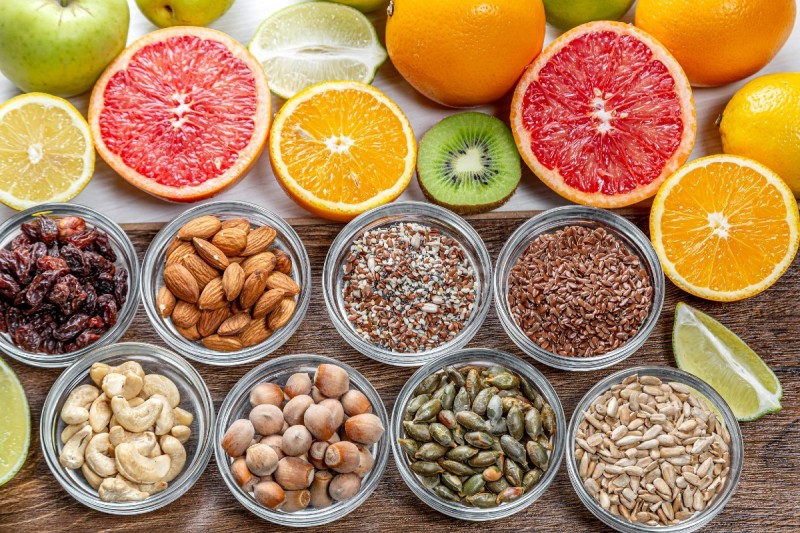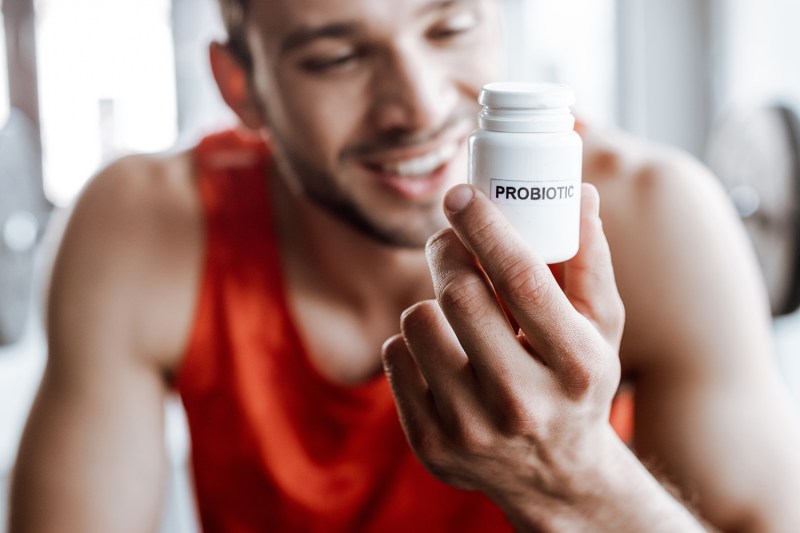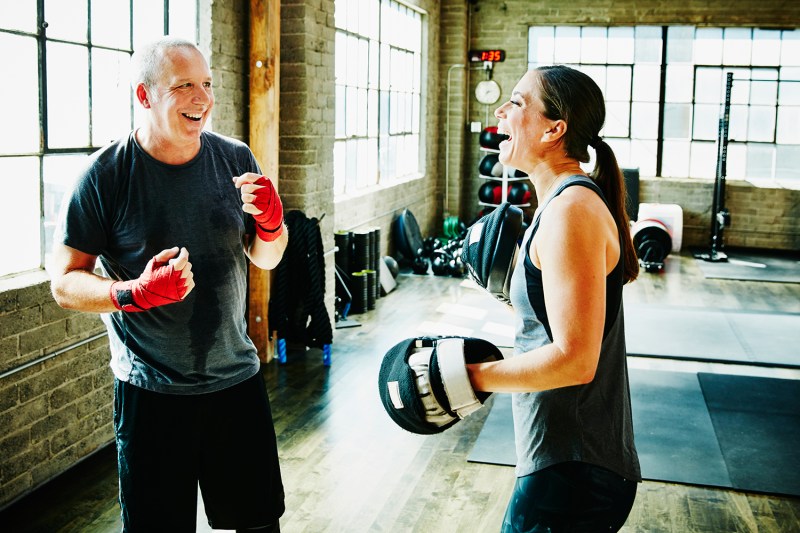
TB12, the health and wellness company founded by former quarterback Tom Brady and body/coach trainer Alex Guerrero, claims to “help people live pain-free and perform their best using the proven techniques of ‘The TB12 Method.’ ” While you may not become the greatest quarterback of all time, daily, focused practice will improve your life.
- 1. Keep a positive mindset
- 2. Drink half your weight in fluid ounces of water
- 3. Make 80% of your diet vegetables
- 4. Get your daily dose of vitamin D
- 5. Consume essential fatty acids
- 6. Skip added sugar, refined carbs, and other processed snacks
- 7. Move for 30 to 60 minutes per day
- 8. Get your vitamin C and eat your citrus fruits
- 9. Add zinc to your diet
- 10. Consume protein every 4 to 6 hours throughout the day
- 11. Sleep at least 8 hours per night
- 12. Get probiotics into your diet
- 13. Bonus tip: Consistency is key
- Long-lasting health
In conversation, TB12 body coach Bryan Hart offers The Manual readers 12 tips to maintain healthy bodies and minds.

1. Keep a positive mindset
“It all starts with a positive mindset,” Hart said in an email. “Start by identifying what your goal or purpose is. Write it down and keep it by your bed, add it as a note in your phone, or do whatever you have to do to give yourself a regular reminder of what you’re working towards. When you’re motivated by a purpose like this, you’ll find it’s much easier to stay determined and pursue your goals.”

2. Drink half your weight in fluid ounces of water
This suggestion is in vogue right now, in part because of TB12. This tip might be a little controversial. If you weigh 200 pounds, 100 fluid ounces is about three-quarters of a gallon or over 12 8-ounce glasses of water. That’s a lot of water.
On one hand, water is a pillar of life. The clear stuff keeps all organs functioning, maintains blood pressure, helps kidneys filter and excrete toxins, and lubricates joints. Too much, though, can filter out too many electrolytes and throw the body’s pH balance out of wack, causing headaches, vomiting, and, in rare cases, death from lack of salt.
So, if you’re a workout warrior, make sure you’re hydrating and getting enough electrolytes/salt. If you’re not as active, don’t force water consumption. Just watch your urine. It should be light yellow and odorless. If it’s clear, you’re drinking too much. If it’s dark yellow, you’re not getting enough.
“See how much better you feel after giving your body the hydration it needs,” Hart said.

3. Make 80% of your diet vegetables
Nutrition is one of the most important factors for producing health and vitality. And the best source of multiple nutrients is fruits and vegetables. Humans have known ever since agrarian societies began. As the father of medicine, Hippocrates, said in ancient Greece, “Let food be thy medicine and medicine be thy food.”
How can you make sure that eight-tenths of your food is veggies and grains? Just use the eye test. Look at your plate and estimate. If you have a chicken breast, for example, load up with multi-colored vegetables that equal four times that portion.
Another trick is to cut back (or cut out) processed food. The body simply can’t break down carbohydrates meant to have shelf lives of hundreds of years. Most people need to eat on the run, which can be an easy excuse to eat out. You can combat this by simply preparing and portioning out meals the day or the week before

4. Get your daily dose of vitamin D
Vitamin D is an essential nutrient that your body needs for many vital processes, including aiding calcium absorption that builds and maintains strong bones. Research suggests that vitamin D can help to boost the immune system and help protect against depression, diabetes, cancer, and heart disease.
Getting your daily dose of Vitamin D can be a challenge in the wintertime, however, especially in more northern climes. Vitamin D is often referred to as “the sunshine vitamin” because your skin hosts a type of cholesterol that, when exposed to the sun’s UV-B radiation, becomes vitamin D.
Low vitamin D intake is actually considered a major public health issue as vitamin D deficiency likely affects over 10% of the world’s population. The issue is that tech-driven humans spend a great deal of time indoors nowadays. It takes very little unprotected sun exposure for your body to produce vitamin D. Sources suggest anywhere from eight to 30 minutes per day, depending on your skin tone.
If it’s still not possible for you to get outdoors every day, you can supplement Vitamin D consumption with fatty fish, mushrooms, yogurt, egg yolks, pills, and even UV sun lamps. The sun, however, is always the best option — vitamin D derived from sunlight can circulate for twice as long as that sourced from food or supplements.

5. Consume essential fatty acids
This aligns with eating enough protein as essential fatty acids, often in the form of Omega-3 nutrients. These fats help build and maintain the structure of every cell wall you have. That means keeping your circulatory system — heart, lungs, capillaries, blood vessels — in solid shape.
Your body also burns Omega-3 fatty acids for energy, keeping you going while boosting the integrity of the immune system. High energy also naturally equates to an elevated mood level, helping to stave off depression because you’re ready for action.
These fatty acids also arrive via oil, which helps to keep joints greased, staving off arthritis and other inflammatory conditions.

6. Skip added sugar, refined carbs, and other processed snacks
This relates directly to suggestion number three. You need to eat throughout the day and you are going to get hungry between meals, especially if you are an active person. This doesn’t provide a good reason, however, to munch on high-sugar and hydrogenated snacks that have zero nutritional value and will lower your mood, your energy level, spike your blood sugar, and lead to all sorts of health issues.
Integrate nuts, sliced fruit and vegetables, nut butters, and healthy, filling fats like yogurt and mayo into your shopping and snack habits. And keep track of how you feel. You’ll be amazed how much better your mood and vitality are after just a few days of going without cupcakes and Cheetos.

7. Move for 30 to 60 minutes per day
Even on recovery days, avid athletes should commit to lower-impact, active recovery exercises, Hart indicated.
“Exercises like glute bridges (lying on your back, lower legs at 90 degrees, arms beside you, and raising your hips and pelvis towards the ceiling), front planks, lateral band walks (moving side-to-side with a band around your feet), and bodyweight squats are some of my favorite ways to get moving and promote recovery without putting too much strain on your body,” Hart said. “These exercises, combined with 10-15 minutes of pliability work, will help relieve muscle tension, improve blood flow, and enhance your overall mobility.”

8. Get your vitamin C and eat your citrus fruits
Vitamin C is one of the more well-known nutrients due to its ubiquity in breakfast juices and foods and in supplements that are meant to stave off sickness. In addition to increasing immunity, vitamin C is critical in building bodily tissues, which help fortify the heart, the eyes, the skin, and other vital organs.
These citrus foods also help to provide the body with fiber critical to breaking down consumed solids and, in so doing, fill up your stomach and act as appetite depressors.
You can also get vitamin C from vegetables (another reason to eat a balanced diet) like broccoli, cauliflower, tomatoes, and tubers like sweet and white potatoes.

9. Add zinc to your diet
Zinc is an integral micronutrient for the body’s function, especially when it comes to the immune system and metabolism. Zinc also helps you to heal wounds and improves your sense of taste and smell. If you find any of these lacking, make sure to add zinc to your diet. Zinc often arrives in the form of meats like chicken, red meat, and seafood, so vegans will often have to find alternatives. Lentils, seeds, and fortified oats and grains in healthy amounts help the body boost zinc.

10. Consume protein every 4 to 6 hours throughout the day
When you’re working and focused all day, it’s easy to forget to fuel your body.
“We recommend eating protein every 4-6 hours throughout the day, at about half your body weight in grams of protein each day — especially protein from sources such as lean meat or nuts, seeds, and legumes,” Hart stated.
If you weigh 180 pounds, say, this means consuming 90 grams of protein. This may seem like a lot, but eating an egg and yogurt with breakfast, and whole meat like beef, chicken, fish, or pork during lunch or dinner, should be close to getting the job done.
In between, prioritize consuming protein whenever possible, such as with snacks like nuts or shakes with whey or plant-based protein powder to supplement protein consumption.

11. Sleep at least 8 hours per night
This is a tough one for most modern folks. Any time work is finished, electronic distractions are waiting. You can build healthy sleep into your life, however, through routine, cutting down nighttime screen time, and going to bed at the same time every night.

12. Get probiotics into your diet
Your body functions as an incredibly complex system of functions. Integral to that beautiful synchronicity are millions of bacteria that add up to the microbiotic colony that lives in your gut. A healthy team keeps things running smoothly, absorbing nutrients into the bloodstream and excreting waste. A poor biotic population does the opposite, leading to constipation, diarrhea, decreased mood, and a host of issues. How do you encourage a healthy gut then? Consume probiotic foods, of course.
The best probiotics are often found in fermented foods because they have already broken down bases to release enzymes vital to the digestive process. Fermented dairy eats include yogurt and kefir, a fermented milk drink. Fermented veggies include sauerkraut and kimchi (fermented cabbage), tempeh and miso (fermented soybeans), pickles (fermented cucumbers), and kombucha (tea made from bacterial colonies). These are also tasty, salty treats that add zest to any food and gusto to your gut, encouraging healthy digestion and heart health.

13. Bonus tip: Consistency is key
As with most things in life, in order for a habit to stick for the long term, it must be done and completed on a consistent basis. While it may not be humanly possible to do all 12 points every day, doing them on a consistent basis is key to success, and that is going to vary from person to person.
Whether that is doing nearly all steps weekly, completing half of them four to five times per week, or simply starting with one to two points per week, this will be different for every man and how he measures success. Ultimately, performing these steps on a frequent basis is going to help bring balance to your life, resulting in a healthier, happier you.

Long-lasting health
Whether you’re a daily commuter, a remote worker, or sweating behind physical labor every day, making these actions habits can help you maintain long-lasting health and positive energy.
Editors' Recommendations
- These beach body workout tips from a pro will help you get in shirtless shape fast
- The 6 best TRX workouts for total body strength and conditioning
- How to build muscle and lose fat through body recomposition
- How to train for better posture (because your WFH habits suck)
- How to lose weight at the gym: 8 helpful tips everyone should follow




